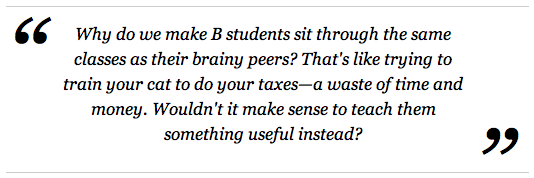 Blair Brandt is the founder and CEO of The Next Step Realty. And at just 22, he’s responsible for managing all the different components of the business: he recruits and manages brokers and Next Step staff, develops relationships with clients, oversees PR and marketing, business operations, legal and financial matters, tax, web design and programming, investment and return on that investments for investors… pretty much everything. Blair spends most of his day meeting with people to seek collaboration, advice, cross-marketing opportunities, and so on. But he found the time to answer some of our questions, so check it out:
Blair Brandt is the founder and CEO of The Next Step Realty. And at just 22, he’s responsible for managing all the different components of the business: he recruits and manages brokers and Next Step staff, develops relationships with clients, oversees PR and marketing, business operations, legal and financial matters, tax, web design and programming, investment and return on that investments for investors… pretty much everything. Blair spends most of his day meeting with people to seek collaboration, advice, cross-marketing opportunities, and so on. But he found the time to answer some of our questions, so check it out:
TILE: How did you come up with the idea for a service like this?
Blair: For the past four years, I worked as an assistant at a real estate firm while in Florida. There I noticed one crucial factor in the marketplace: the power of referrals and the importance of having good leads for a realtor.
Especially in bad times, having personal networks that could deliver you with quality clients was the way to continued success. SO, if we were going to set up a leads service, we needed to find a niche that we could specialize in and that could be ours.
We realized our niche when my friends from college started to call me asking if I knew brokers in the cities they were moving to for new jobs. So, while I was helping a few of my friends get matched up with the right brokers, my friend and future business partner Belton Baker picked up on what I was doing and said – listen, let’s market this to everyone we know, and everyone they know. We immediately saw the demand for an improved, streamlined housing transition from college to the real world.
TILE: What was your first apartment search like?
Blair: Our first apartment search actually went pretty well. We spent months recruiting the best real estate brokers for the job in major cities, and we really did some extensive interviewing and personal networking to make sure we were dealing with the right people. Once we started to get our clients, which happened more in a wave of hundreds than in any one single first search, the brokers were very well prepared to service the clients. Most of their clients were young professionals anyway and this is what they specialized in, but they hadn’t directly marketed their services to colleges – that became our business.
TILE: Why is your logo a giraffe? 
Blair: My philosophy from the time I started this company with Belton is that the transition from college to the real world is one of the most intense psychological and logistical bridges young people must cross. Of course, life offers countless challenges after graduation, but the change in lifestyle from student to adult is a rapid one for recent graduates. Graduates are often embarking on their first job and career, and in the meantime making all the other adjustments required in moving to a new city. We decided if we could help recent graduates by solving one of the problems – housing – we could develop our own niche market in the process. The giraffe is symbolic and metaphorical because it represents the nature of our clients during this transition. Giraffes take some of the largest steps of any animal and they reach high. Our clients are similarly reaching high in their new beginning and taking a very large step into the real world and their first home.
TILE: What advice would you give your teenage self?
Blair: Dream big.
TILE: Can you tell us a secret about the real estate business?
Blair: It’s about specialized service, having an expertise in a particular process or niche, and building relationships with expanding networks of people. Most of what we do is personal networking. We started this business with a list of 500 students at college campuses to help spread the word, and the domino effect is beyond what we ever expected. First friends, then friends of friends, then friends of friends of friends, and before you know it, you are dealing directly with the public. If you can specialize in a certain real estate niche, associate yourself with that niche, and then use networks to create momentum, you can get something off the ground fast.
To see Blair talking in real life, check out his recent interview on Bloomberg TV: http://bit.ly/dlIxYM
>> TILE brings you exclusive opinions, explanations, and interviews from experts in every industry. To read more, click on Ask the Experts in the TILE Library.
Have a burning question or an expert you’d like to see interviewed? Just Ask TILE!
 Josh Weinstein is the founder of YouAre.TV. YouAre.TV allows anyone to be on TV and interactive gameshows via webcam. He previously
Josh Weinstein is the founder of YouAre.TV. YouAre.TV allows anyone to be on TV and interactive gameshows via webcam. He previously

 Blair Brandt is the founder and CEO of
Blair Brandt is the founder and CEO of 